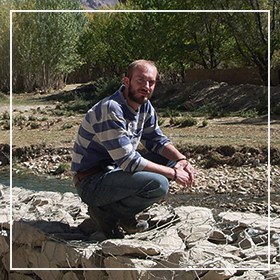Young man: Hey, what’s he talking about?
Old man: The professor is discussing ideas of justice and humanity in the philosophy of Plato.
Young man: Plato?
Old man: Plato, the Greek philosopher…
Young man: Yeah, I know, I know… Wasn’t he a slave master?
Old man: Well, some sources say he owned slaves…
Young man: I see… I’m sure he had great ideas about justice and humanity!
Old man: You know, in Plato’s time it was normal for someone of his status to have slaves.
Young man: Yes, that’s why we should probably be sceptical about what is viewed as normal in our own time.
Old man: But isn’t it amazing that we are still studying his work so many centuries later?
Young man: Well, isn’t it incredible that there are still slaves in the world?
Facing legacy…
Historically, the majority of professors in the social sciences and humanities in Italy (as in France, Germany, etc.…) have come from long-established and well-educated bourgeois families. Only very recently have working-class scholars begun to access academic positions to a significant extent. Yet even today humanities and social sciences departments are influenced by this weighty bourgeois legacy. I use the term “bourgeois” here not in the strictly Marxist sense but with a broader meaning that includes relatively well-off families (not necessarily very rich) whose members are educated, frequently display left-wing political sympathies and belong to groups of cultural élite, sharing their cultural capital, and indeed spending most of their time, with people of similar social status (aside from their philanthropic leanings which often bring them to the slums). Despite the fact that we are all happy nowadays to join in the neoliberal refrain that all persons are equal and class boundaries no longer exist, inter-class marriages are still a rarity in contemporary Italian society.
Although in the period following the Second World War, working-class students increasingly gained access to university education, it was extremely difficult for them to attain professorship positions due to the nepotistic and exclusivist nature of the academic system. One of the principal mechanisms that de facto excluded scholars of working-class origins from permanent positions was the precarious employment status of post-graduate work. The rule was – and generally still is – that on completion of their graduation (or, from the 80’s, of their PhD, “Dottorato di ricerca”), young scholars were required to spend several years working – largely unremunerated – for a professor, until the latter decided that it was the time for them to be allocated a post. And who of the working class could afford to work without payment for several years? Almost nobody. Only those who were heavily economically supported by their families could survive such a punitive academic enrolment mechanism.
The past few years have seen some change, but the system still functions in such a way as to create many obstacles for those who need a salary to make ends meet. When I completed my PhD in Anthropology, a professor told me: “The trouble with you guys is that you need to get paid”. Not to mention the difficulties encountered if you aspire to having a family of your own (here gender inequalities become particularly aggressive, to the extent that a PhD student or post-doc who becomes pregnant may easily be excluded from research groups or opportunities for future positions because considered “not reliable”)
Most professors in the social sciences that I have met have grandparents (or even grand-grand parents) who were university graduates and professionals – doctors, professors, art collectors, architects, and so forth. Both my grandmothers were illiterate; my father went to work at the age of 12 and my mother started to combine schooling and empoyment when she was 13 and had full-time job at the age of 15 (although studying was what she really wanted to do). I was born in 1979 and my cousins and I are the first generation of the family not only to have received a university education (a few of us also hold a Ph.D.), but to have attended high school at all. Perhaps this explains the feeling of unease that I have experienced throughout my entire academic path, my sense of being suspended between two social worlds (bourgeois academia and my own working-class background) but somehow uncomfortable in both. Although the popular knowledge I was immersed in through my family and the farsighted “beyond-class vision” of my parents – as well as their crucial moral and material support – may well have represented for me not simply the bridge between these two worlds, but the need to rise above them.
 Departments all around the country are increasingly recruiting scholars of working-class origins, but mostly to precarious positions – for instance, the role of Assistant Professor, which in the past was a permanent position, is currently fixed-term. Despite its ostensible goal of enhancing the quality of Italian university and fighting its nepotistic system, the only evident effect of the recent university reform has been the further precarization of researchers. But aside from the precarious status of new generations of scholars, what I wish to emphasize here is that this bourgeois academic dominance has historically produced a specific bourgeois knowledge, particularly in relation to social inequality. My basis for this claim – as questionable as it may be – is that the way in which scholars see the world and thus, for instance, produce scientific knowledge, is not solely a function of personal ideas and experience but is also deeply influenced by their social status. Of course many other variables can influence the work of a scholar, such as personal attitudes, individual sensibility, health, random life events (loss of loved ones, unexpected good fortune, the outbreak of war…) etc.. However, while these other factors are part of the incommensurable variety of human experience – thus bearing mostly unforeseen consequences – I believe that the bourgeois legacy in the academic system has produced – and produces – a specific form of knowledge, which has significant implications for the way in which humanitarian agencies or governance institutions, for example, address the problem of social inequality. It is needless to reiterate that this may be the case in some contexts but not in others. I here only contend that this is the predominant reality in the current Italian university scenario – although I most definitely do not believe that Italy represents an exception at the global, and particularly European, level.
Departments all around the country are increasingly recruiting scholars of working-class origins, but mostly to precarious positions – for instance, the role of Assistant Professor, which in the past was a permanent position, is currently fixed-term. Despite its ostensible goal of enhancing the quality of Italian university and fighting its nepotistic system, the only evident effect of the recent university reform has been the further precarization of researchers. But aside from the precarious status of new generations of scholars, what I wish to emphasize here is that this bourgeois academic dominance has historically produced a specific bourgeois knowledge, particularly in relation to social inequality. My basis for this claim – as questionable as it may be – is that the way in which scholars see the world and thus, for instance, produce scientific knowledge, is not solely a function of personal ideas and experience but is also deeply influenced by their social status. Of course many other variables can influence the work of a scholar, such as personal attitudes, individual sensibility, health, random life events (loss of loved ones, unexpected good fortune, the outbreak of war…) etc.. However, while these other factors are part of the incommensurable variety of human experience – thus bearing mostly unforeseen consequences – I believe that the bourgeois legacy in the academic system has produced – and produces – a specific form of knowledge, which has significant implications for the way in which humanitarian agencies or governance institutions, for example, address the problem of social inequality. It is needless to reiterate that this may be the case in some contexts but not in others. I here only contend that this is the predominant reality in the current Italian university scenario – although I most definitely do not believe that Italy represents an exception at the global, and particularly European, level.
Sometimes hiding behind Marxist or (today possibly even more frequent among social scientists) Gramscian screens, academics have made the issue of social inequality – and social suffering, or marginality – a key topic that is very useful for their university careers. But while Gramsci’s thinking was the expression of the highly concrete demands inherent in his political beliefs and – indeed – his social class consciousness, most contemporary re-interpretations of his intellectual production fall in the realm of aesthetics and philanthropy. This I believe to be one of the most significant implications of bourgeois production on social inequalities: that is to say, the highly factual and brutal dimension of social suffering and marginality is transformed into an issue of “representation”.
Within the so-called academic ivory tower, social inequalities are aestheticized, turned into “discourse”, while all the miserable and more material consequences of social suffering disappear.
And thus in the eyes of left-wing bourgeois academics, slums become “laboratories of social resistance”, in which the poor are always the good poor, the migrant is always the good migrant, and so forth, in a paradigmatic extension of the myth of the good savage. Indeed, there has been a striking proliferation of such (visual, dialogical, virtual…) “laboratories”, which, on purely logical grounds, make people living in slums akin to guinea pigs. In this context, the distance between the bourgeois approach of scholars/philanthropists and raw reality takes on significant proportions. Greed, cruelty, egoism, spirit of survival vanish from slums and working-class neighbourhoods, and what remains is an apologetic version of the world, explained in terms of post-modern notions of agency and subjectivity or neutralized (because transformed into aesthetics) Gramscian theories. Or at times, somewhat confusedly, in terms of both.

The very concept of “resistance” itself – especially as it has been used by anthropologists – has been reduced to a carnivalesque antagonism or an unconscious glimmer of agency, rather than a political reaction or propulsion to subvert the social order on the part of a given social class. Ironically (yet dramatically), all too often the do-good approach generously displayed by social scientists in their “writings on the margins” disappears when they sit on the departmental committees of their universities. Moral ambiguity, corporativism and formal obedience to the institution are the other side of the philanthropic coin for the social science bourgeois. It is by no means rare to witness a gaping difference between what academics write in their books or articles and the way in which they elect to run research groups, departments, and so on. I have heard a multitude of talks, conferences and seminars on “the need to understand those at the margins” or “hegemonic cultures affecting socially disadvantaged people”, only to find myself wondering along with fellow PhD students or post-docs how a person who is not even able to have a sane human relationship with university colleagues could possibly be able to understand those in dire need.
Anthropologist Carolyn Nordstrom rightly pointed out in a talk in Milan in 2006 that
“We know that the person who abusively fires a colleague in their own pursuit of power does not produce theory in the same way as a colleague we trust to be honourable – even if their theoretical orientations are ostensibly the same – because they move their realities, their deep perceptions of life and of Being, into their theory. And yet we accept these divisions that separate our theories from an analysis of the very generative experiences that animate them in the academy and beyond”.
This may not be necessarily related to the bourgeois legacy, but certainly ethnography at the mercy of moral ambiguity becomes a dangerous methodological instrument in the hands of bourgeois scholars, insofar as it fosters the rhetoric of “closeness” between the scholar and the people he/she sets out to interact with.
 Indeed, while the voice of the social scientist remains the voice of the social scientist, the use of ethnography to justify representing social suffering as those at the margins, slaves, victims of violence, poor people, and so forth experience it, has the potential to be highly ambivalent. The fact that bourgeois academics have somehow become the voice of socially disadvantaged people – contemporary sociocultural anthropology is indeed at stake here – has reinforced a process of social and political expulsion. Socially disadvantaged people are located at a level of political absence and inability to communicate, which the ethnographer claims to compensate for via his/her presumed “dialogical” or “collaborative” methodology and academic production.
Indeed, while the voice of the social scientist remains the voice of the social scientist, the use of ethnography to justify representing social suffering as those at the margins, slaves, victims of violence, poor people, and so forth experience it, has the potential to be highly ambivalent. The fact that bourgeois academics have somehow become the voice of socially disadvantaged people – contemporary sociocultural anthropology is indeed at stake here – has reinforced a process of social and political expulsion. Socially disadvantaged people are located at a level of political absence and inability to communicate, which the ethnographer claims to compensate for via his/her presumed “dialogical” or “collaborative” methodology and academic production.
In an act of intellectual honesty, in the preface to his key work Asylum in 1961, Erving Goffman warned the reader “that my view is probably too much that of a middle-class male; perhaps I suffered vicariously about conditions that lower-class patients handled with little pain”.
It is rare to find similar acknowledgement on the part of anthropologists that their bourgeois background and particular cultural capital might have affected the way they translated social suffering and inequalities from the “dimension of ground” (to borrow Ernesto Laclau’s expression, introduced in his Emancipaption(s), 1996) into academic writing. Edmund Leach addressed the issue of social class in his 1984 “Glimpses of the Unmentionable in the History of British Social Anthropology”. However, the later(doctrinaire) preoccupation of post-modern anthropology with the authority of the ethnographer both during fieldwork and in the writing process was more the disguised outcome of the bourgeois legacy within the discipline rather than an attempt to question anthropologists’ class belonging. It was never (or very rarely) social class at stake. Only over the past few decades has the power of the ethnographer been re-balanced due to the simple fact that ethnographic researchers themselves have increasingly come from the lower classes.
The problematic issue of understanding who is absent from and who de facto writes history has been systematically addressed by scholars of post-colonial and subaltern studies. The main interest of these scholarly schools of thought has been to show that the Eurocentric method of historical enquiry into non-Western cultures produced a history in which the voice of the colonized was absent, marginal, or transformed in line with the needs of the hegemonic colonial order, particularly in relation to the Indian Subcontinent. However, the overall result has been a corpus of sophisticated literature produced by an élite of scholars whose dilemma was probably more philosophical than social. It is true that Marxist historians have investigated colonial history told from the perspective of the proletariat, thereby addressing the issue of the absence of working-class voices from world history. But my point here is that to a great extent this broad scholarship was produced from a privileged perspective and the issue of ensuring working-class access to the very place in which knowledge is produced was once again overlooked.
In the current technocratic and neoliberal conjuncture of the history of academia, social inequality is a conventional topic for research projects conducted by emergent project managers: that is to say, by academics. I recently had a conversation with an Italian anthropologist who remarked: “Yes, we may call it bourgeois philanthropy, or perhaps bourgeois humanism. But the truth is, with the way things are going nowadays, I do not see myself as either a philanthropist or as a humanist. We are all bureaucrats”.
 The feeling voiced by this scholar is certainly not an isolated case. The fact that academic work is increasingly affected by extreme levels of bureaucracy is an issue for everybody. But it is not simply a question of bureaucracy. The university system is undergoing a process of empting out of intellectual creativity, creating a vacuum which in turn is being filled up with supposedly universal academic standards that force scholars to present themselves in certain ways, be well-disciplined, goal-oriented knowledge producers, fund raisers and teachers who are positively evaluated by their students. The students are themselves reduced to the status of consumers (significantly, in Italy courses and exams are structured in terms of credits and debts) who must be satisfied, otherwise they will choose another university.
The feeling voiced by this scholar is certainly not an isolated case. The fact that academic work is increasingly affected by extreme levels of bureaucracy is an issue for everybody. But it is not simply a question of bureaucracy. The university system is undergoing a process of empting out of intellectual creativity, creating a vacuum which in turn is being filled up with supposedly universal academic standards that force scholars to present themselves in certain ways, be well-disciplined, goal-oriented knowledge producers, fund raisers and teachers who are positively evaluated by their students. The students are themselves reduced to the status of consumers (significantly, in Italy courses and exams are structured in terms of credits and debts) who must be satisfied, otherwise they will choose another university.
A professor of history at Cornell University told me that in order to protect herself from student evaluations she strives to set the course as much as possible in line with her students’ preferences and tastes. In the long run, this will lead to the “dumbing down” of university education: university professors and lecturers are (where such systems are already in place) or will be (where they have only been partially implemented to date) focused on making themselves “agreeable” to students at all costs, by decreasing the workload, giving high marks in exams and so on. The students/consumers are thus free to go to the university/grocery store where they can buy what they want. (Of course “free” and “want” are problematic categories in such a scenario).
For me, the bourgeois legacy has always represented an unheard “wake-up call” that insistently drew attention to the oncoming university crisis which is now full-blown. Largely unchallenged, the university has moved on from a past of being the intellectual apparatus of the bourgeois system to being the preparatory institution – though with a persistently strong bourgeois identity – of neoliberal efficiency and pragmatism on the contemporary scene. And academics have played a key role in this shift, by supporting or passively accompanying the political forces operating in this direction and impeding the academic consolidation of a non-bourgeois knowledge with its destabilizing potential for the social order.







Simply fantastic, thanks for this article, I’m so happy you explained the strains and pains of being working-class and having aspirations of becoming a university teacher or researcher. I’m from Spain and here the situation is exactly the same. I can’t understand why this is not known or acknowledged by people in general and at university contexts specifically. Class differences and social inequality are still deeply rooted in our modern, democratic societies. It’s time to cry it out loud! Totally agree with you, university is revoltingly bourgeois and clearly oriented to the perpetuation of the status quo.
Thanks again
Sonia
Antonio, great read, and thanks for indicating the problem. Exactly as you point out, the Indian subaltern scholars are particularly bourgeoisie. The problem is that the university-based knowledge creation is a particularly feudal mechanism. People inside decide who to let in, and in such a scenario, it is unlikely that people who challenge the fundamentals of the bourgeois knowledge will be let in. To add to your example of the professorial-evaluation system, I think the peer review process also acts against a non-bourgeois-ization of the social and human sciences. I wonder, what you would offer as a way to integrate what you term the “non-bourgeois knowledge” creation within the universities.
Thanks for the nice article, once again.
Historically the production of knowledge has been elitist but, comparatively speaking, now there seems to be less elite – some say there is also less knowledge – but one thing appears to be clear in that the mechanisms of exclusion are stil there and they are perpetuated.
This is exactly what we are experiencing in Africa. African knowledge production is still at the hands of bourgeois neo-colonial academics. They aesthetics knowledge do not intent to make African subjects of their own history, but to keep Africans at the receiving end as objects of academic analysis and charity. There is no acknowledgement that these so called Africanists are producing an Africa as imagined by their colonial mind. Europeans have not gone through a process of decolonizing their minds, I mean they were forced to leave Africa physically, but mentally, they still think that they own Africa. this could be seen by the arrogance of their politicians and hypocrisy of their scholars when they talk or write about Africa. One Belgium scholar who traveled to Boston to talk about the Congo was asked if they were no Congolese able of conveying a much original message, he answer was that one don’t need to be a Congolese to talk about the Congo. yes and no, yes it is evident that a daughter of a former cololialist feels all the right to talk about the country her grand parent “civilized.” No, because the scholarship on the Congo by Belgium carries with it all the colonial background. No scholarship so far has changed Africa for real. But, the goal is not changing Africa, but producing them as objects of charity and never as subject of a history.
Really enjoyed this article Antonio.
When you come back to Kabul – let’s make that research seminar a round table discussion on higher education.
best wishes
Liza
Many thanks for this article! We are all immersed in a social world shaped by a such a bourgeois knowledge. The neoliberal dominant evolution of the academic system should be at stake in all faculty discussions for future plans – yet it is indeed not the case, at least not in France and Germany, the places I know better.
“all too often the do-good approach generously displayed by social scientists in their ‘writings on the margins’ disappears when they sit on the departmental committees of their universities”. Yes, sadly true!!
Great piece.
The question that arises at this point is: Is university the place where we can express our intellectual freedom?